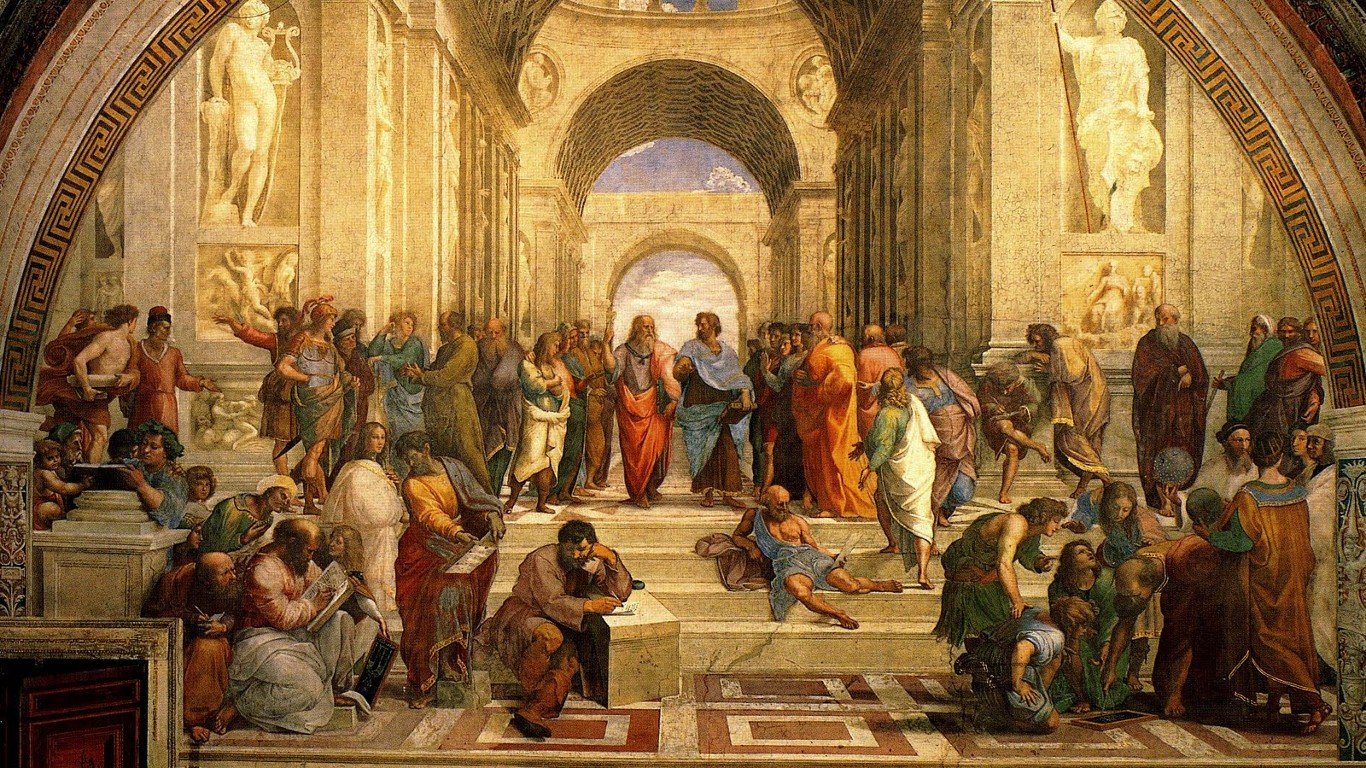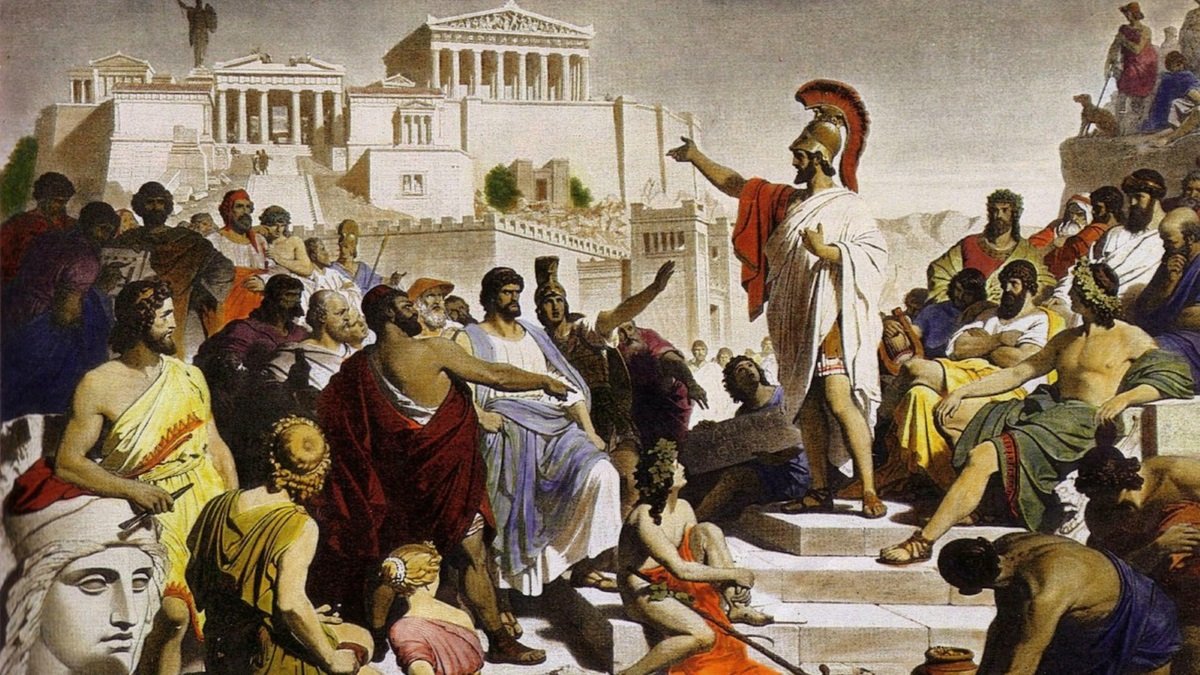(recommend audio) The Athenian Revolution (508–507 BCE) was a revolt by the people of Athens that overthrew the ruling aristocratic oligarchy, establishing the almost century-long self-governance of Athens in the form of a participatory democracy – open to all free male citizens. It was a reaction to a broader trend of tyranny that had swept through Athens and the rest of Greece at the time.
Background
According to legend, Athens was formerly ruled by kings, a situation which may have continued up until the 9th century BCE. During this period, Athens succeeded in bringing the other towns of Attica under its rule. This process of synoikismos – the bringing together into one home – created the largest and wealthiest state on the Greek mainland, but it also created a larger class of people excluded from political life by the nobility.
By the 7th century BCE, social unrest had become widespread, as Athens suffered a land and agrarian crisis. Many Greek city-states had seen the emergence of tyrants and opportunistic noblemen who had taken power on behalf of sectional interests. In Megara, Theagenes had come to power as an enemy of the local oligarchs.
His son-in-law, an Athenian nobleman named Cylon, himself made an unsuccessful attempt to seize power in Athens in 632 BCE. However, the coup was opposed by the people of Athens, who forced Cylon and his supporters to take refuge in Athena‘s temple on the Acropolis. Cylon and his brother escaped, but his followers were cornered by Athens’ nine archons (the chief city officials) and stoned to death.
Reform and revolution
In 594 BCE, Solon, premier archon at the time, issued reforms that defined citizenship in a way that gave each free resident of Attica a political function: Athenian citizens had the right to participate in assembly meetings. By granting the formerly aristocratic role to every free citizen of Athens who owned property, Solon reshaped the social framework of the city-state. Under these reforms, a council of 400 members (with 100 citizens from each of Athens’s four tribes) called the boule ran daily affairs and set the political agenda.
Democracy however was threatened by tyranny, as several political factions began to vie for control of the Athenian polis. Peisistratos launched a populist coup and seized the reigns of government in Athens, declaring himself Tyrant. Upon his death, Peisistratos was succeeded to the tyranny by his sons Hippias and Hipparchus, the latter of which was murdered by the tyrannicides Harmodius and Aristogeiton.
Hippias executed the tyrannicides and it was said that he became a bitter and cruel ruler, executing a large number of citizens and imposing harsh taxes on the Athenian populace. Hippias’s cruelty soon created unrest among his subjects. As he began losing control, he sought military support from the Persians and formed alliances with other Greek tyrannies.
The Alcmaeonidae family of Athens, which Peisistratus had exiled in 546 BCE, was concerned about Hippias forming alliances with the Persian ruling class, and began planning an invasion to depose him.
In 510 BCE Cleomenes I of Sparta successfully invaded Athens and trapped Hippias on the Acropolis.They also took the Pisistratidae children hostage forcing Hippias to leave Athens in order to have them returned safely. Hippias was one of several Greek aristocrats who took refuge in the Achaemenid Empire following reversals at home.
Athenian Revolution
With the tyrant ousted, the Spartan king installed Isagoras at the head of an oligarchy, made up of Athenian aristocrats that were loyal or sympathetic to Sparta. He found himself opposed by the majority of Athens, particularly the middle and lower classes, who desired a return to democracy. Cleisthenes, of the pro-democracy Alcmaeonidae clan, was expelled from Athens by the Spartan-backed oligarchs, leaving Isagoras unrivalled in power within the city.
Isagoras set about dispossessing hundreds of Athenians of their homes and exiling them on the pretext that they too were cursed by the Alcmaeonidae miasma, he also attempted to dissolve the Boule. However, the council resisted, and the Athenian people declared their support for the council and revolted against the oligarchy.
Cleomenes, Isagoras and their supporters were forced by regular citizens to flee to the Acropolis, where they were besieged by Athens’ populace for two days. On the third day the Athenians made a truce, allowed Cleomenes and Isagoras to escape, but executed 300 of Isagoras’ supporters. Cleisthenes was subsequently recalled, along with hundreds of exiles, and he was elected the first archon of a democratic Athens.
Cleisthenes began to institutionalize the democratic revolution. In order to forestall strife between the traditional clans, which had led to the tyranny in the first place, he changed the political organization from the four traditional tribes, which were based on family relations and which formed the basis of the upper class Athenian political power network, into ten tribes according to their area of residence (their deme,) which would form the basis of a new democratic power structure.
Cleisthenes also abolished patronymics in favour of demonymics (a name given according to the deme to which one belongs), thus increasing Athenians’ sense of belonging to their local community, thus completely undermining the rule of aristocratic families.
He also established sortition – the random selection of citizens to fill government positions rather than kinship or heredity. He also introduced the bouletic oath, “To advise according to the laws what was best for the people”.
The court system and the Boule were also reorganized and expanded. It was now the role of the Boule to propose laws to the assembly of voters, who convened in Athens around forty times a year for this purpose. The bills proposed could be rejected, passed or returned for amendments by the assembly.
Cleisthenes also may have introduced ostracism (first used in 487 BCE), whereby a vote by a plurality of citizens would exile a citizen for 10 years. The initial trend was to vote for a citizen deemed a threat to the democracy (e.g., by having ambitions to set himself up as tyrant). However, soon after, any citizen judged to have too much power in the city tended to be targeted for exile.
Under this system, the exiled man’s property was maintained, but he was not physically in the city where he could possibly create a new tyranny. One later ancient author records that Cleisthenes himself was the first person to be ostracized.
Author Profile
Latest entries
 History20/07/2020The Most Bizarre Things That Was Found In Ice
History20/07/2020The Most Bizarre Things That Was Found In Ice History20/07/2020The Maid of Orléans : How Joan of Arc defeated the English
History20/07/2020The Maid of Orléans : How Joan of Arc defeated the English History03/07/2020Religious Cults That Changed The Course Of History
History03/07/2020Religious Cults That Changed The Course Of History History22/04/2020World War II Stories: Nazis Killed Her Husband, She Bought A Tank And Went On A Rampage
History22/04/2020World War II Stories: Nazis Killed Her Husband, She Bought A Tank And Went On A Rampage





Hi there! I know this is kinda off topic however , I’d figured I’d ask. Would you be interested in exchanging links or maybe guest authoring a blog post or vice-versa? My website goes over a lot of the same subjects as yours and I feel we could greatly benefit from each other. If you’re interested feel free to send me an email. I look forward to hearing from you! Awesome blog by the way!
I have read so many posts concerning the blogger lovers
however this post is actually a pleasant piece of writing, keep it up.
Every weekend i used to pay a visit this web
page, because i want enjoyment, for the reason that this this web page conations
truly fastidious funny material too.
UFC 249 Live Stream will be available for free online in the US, UK, and Germany. Here’s how to watch UFC 249 stream online from anywhere in the world, aslo UFC 249 time of main card fights.
Hello, Neat post. There’s an issue with your site in internet explorer, would check this?
IE nonetheless is the marketplace leader and a good section of people will omit your great
writing due to this problem.
Thank you for sharing your info. I really appreciate your efforts and I will be waiting for
your further post thanks once again.
I every time spent my half an hour to read this webpage’s posts every day along with a
cup of coffee.
Some genuinely interesting details you have written.Aided me a lot, just what I was looking
for :D.
Thank you for your site post. Brown and I have been saving for our new publication on this theme and your short article has made all of us to save
our own money. Your ideas really resolved all our questions.
In fact, in excess of what we had thought of in advance of the time we found
your superb blog. My spouse and i no longer nurture
doubts along with a troubled mind because you have attended to our needs in this post.
Thanks
First of all I want to say superb blog! I had a quick question that I’d like to ask if you do not mind.
I was curious to know how you center yourself and clear your mind prior to writing.
I’ve had a tough time clearing my mind in getting my ideas out.
I truly do enjoy writing but it just seems like the first 10 to 15 minutes are lost
simply just trying to figure out how to begin. Any ideas or tips?
Thank you!
Hello my friend! I want to say that this post is amazing, great written and come with almost all vital infos.
I would like to peer extra posts like this .
Thank you for tthe good writeup. It in reality was a leisure account it.
Look complicated to far delivered agreeable from you! By tthe way, how caan we keep in touch?
Greetings! Very helpful advice within this post!
It’s the little changes that produce the most significant changes.
Thanks a lot for sharing!
Heya i am for the first time here. I came across this board and I find It truly useful &
it helped me out much. I hope to give something back and help others like you aided me.